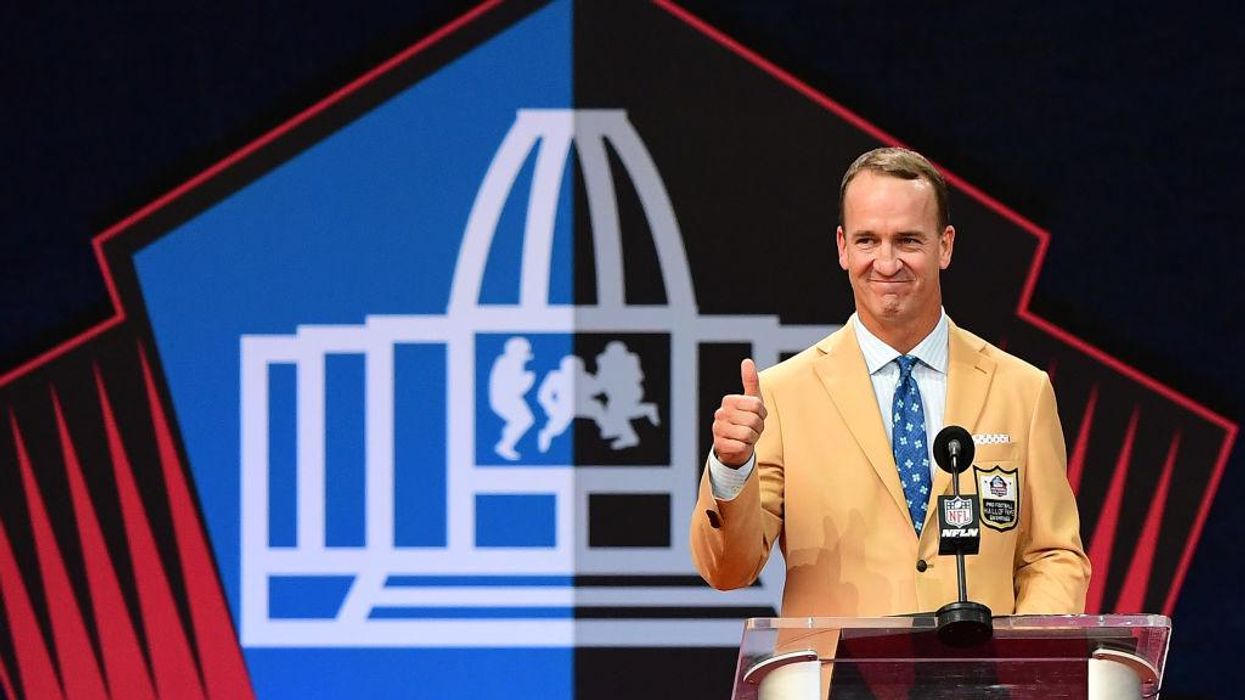
Emilee Chinn/Getty Images

For more than 40 years, the Pro Football Hall of Fame speeches have been my personal state of the union address. I love football. It means the world to me.
Faith, family, and football truly shape my worldview.
Yesterday, for the first time in a long time, I felt better about the state of our union. Peyton Manning, Charles Woodson, Calvin Johnson, John Lynch, Alan Faneca, and Tom Flores were all deservedly inducted into the Hall on Sunday. The day before, the NFL enshrined 20 other men into Canton. The large Saturday ceremony was partly because COVID wiped out the 2020 ceremony. It was also oversized because the world has turned soft, lowered its standards, and fears offending anyone. We'd rather diminish the prestige of the Hall of Fame than fend off the complaints of entitled men.
Whatever. Saturday's circus did not stop my enjoyment of Sunday's festivities. Football's Hall of Fame speeches are my barometer for the mood of men. Based on what I heard from Manning, Johnson, Lynch, and Faneca the mood of men is moving toward responsibility, accountability, and action.
Manning talked about protecting and supporting the game of football. Johnson discussed helping men and women who live with pain. Lynch called on athletes to be leaders in promoting unity. Faneca, who suffers epilepsy, spoke about not letting your obstacles keep you from your goals.
Their speeches conveyed a message of personal responsibility. This is, generally speaking, always a theme when successful people relive what defined their success. However, in the previous two Hall ceremonies, the mood of men was heavily influenced by fraudulent social media activism and narcissism.
Wide receiver Terrell Owens skipped the 2018 ceremony entirely. Frustrated that he wasn't a first-ballot inductee, Owens held a private ceremony at his college. Fellow receiver Randy Moss wore a tie with the names of black men and women he argued were victims of racist police brutality. In 2019, defensive back Champ Bailey ended his speech calling himself an expert on blackness and scolding anyone who didn't support his narrative on racial justice.
Some of the greatest football players of all time turned the Hall of Fame ceremony into the Victimhood Olympics.
On Sunday, from the men who deserved to make it to the Hall of Fame — Manning, Woodson, Johnson, Lynch, Faneca, and Flores — I heard no cries of victimhood. I heard examples of how determined you have to be to make it in this world. That's what we need to hear right now. That's what I'm used to hearing at the Hall of Fame.
When I was a kid, before there was an ESPN or an NFL Network, we would only get to see highlights of the speeches during halftime of the Hall of Fame exhibition game. So we only saw bits and pieces of what Dick Butkus and Johnny Unitas said in 1979 or what Deacon Jones said a year later. I know I found the highlights inspiring. I would immediately make my mother listen to the speech I planned to deliver three decades later when I joined my football idols in immortality.
Now the Hall of Fame ceremony is a major TV production. Far more than the contrived ESPY Awards, football's hall induction ceremony is the Academy Awards of sports. It has become sports' greatest annual celebration. The inductees give emotional and profound speeches. To the best of their abilities, grown men express sincere gratitude to the people who helped them fulfill a lifelong dream. It's the equivalent of a dead person announcing at their funeral that they're in heaven and that they briefly returned to earth to thank the people who steered them on their journey to the pearly gates.
You smile, laugh, cry, and applaud while watching the ceremony.
Maybe this year's ceremony pivoted to substance and facts because of the time constraints placed on the speakers. They were instructed to keep their speeches to six minutes. Most of them spoke for about 10 minutes, breaking the recent tradition of inductees speaking as long as 30 and 40 minutes.
I loved every minute of Ray Lewis' passionate 30-minute speech and every second of Tony Gonzalez's composed 40-minute speech.
But brevity sparks discipline and focus. It eliminates time to virtue-signal and grandstand. It eliminates narcissism. There's only time to say what you really mean.
It feels like we're running short on time to rescue the American values that made us free and unique. It's time for men to say what they really mean.Jason Whitlock
BlazeTV Host